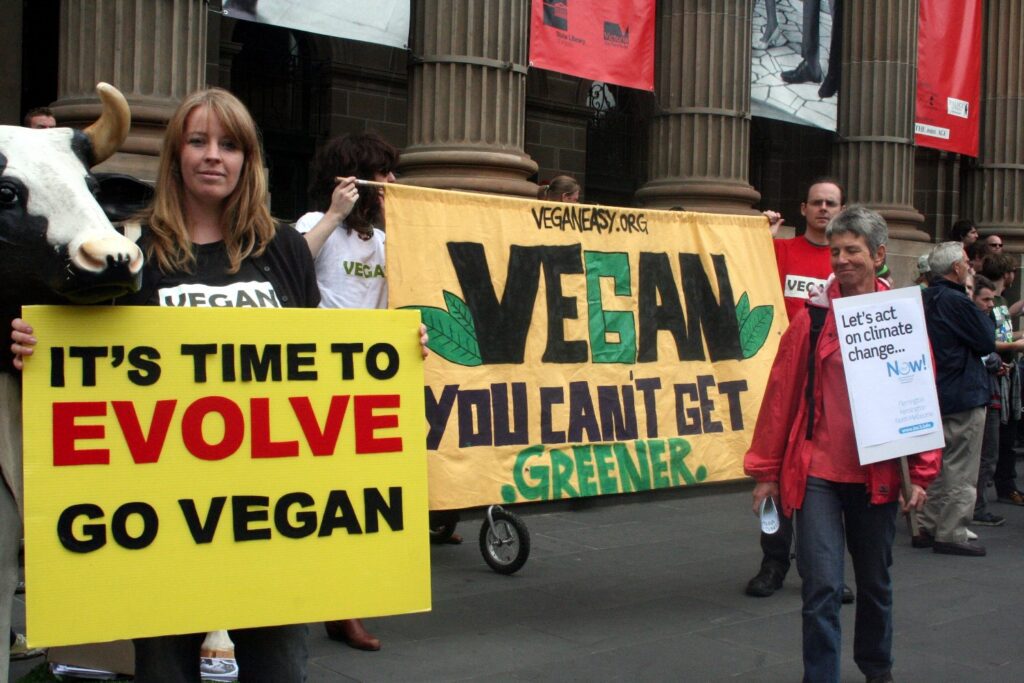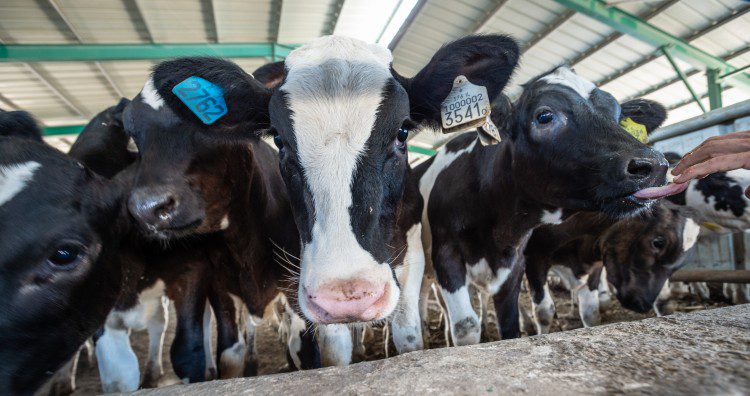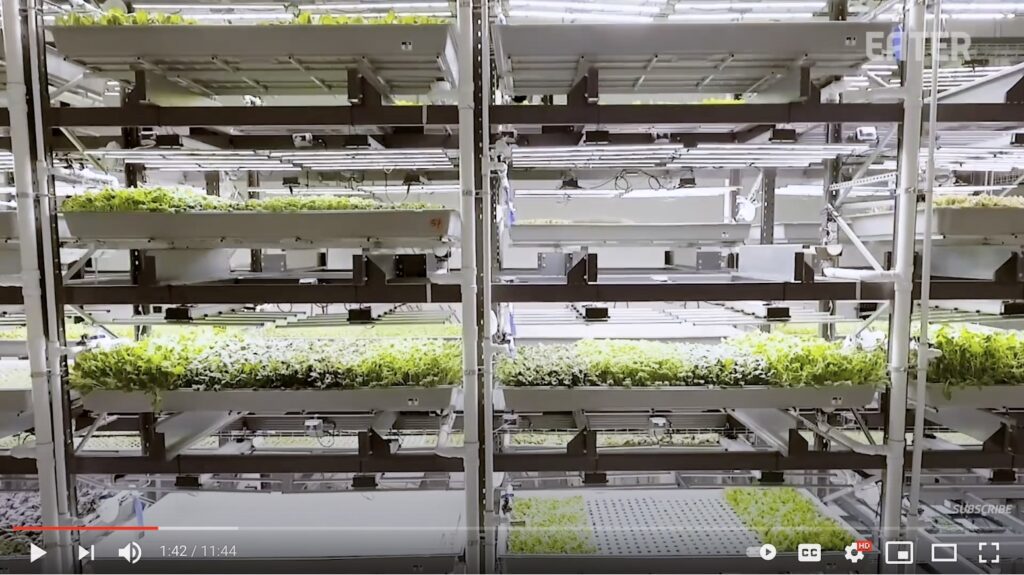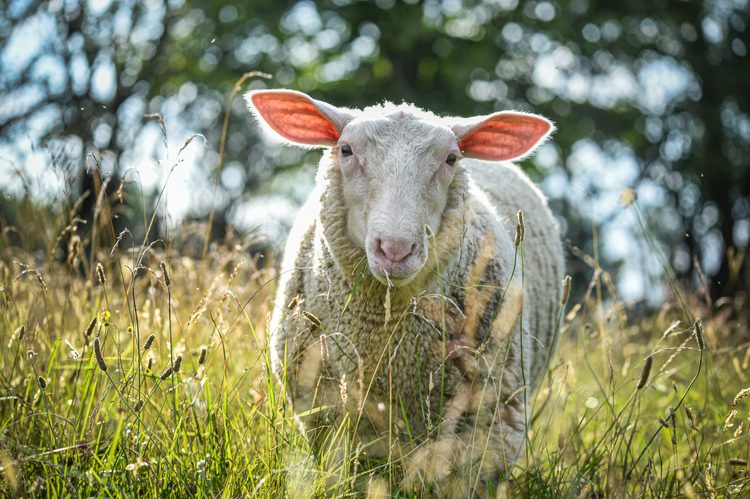


A call for more plant-based eating draws battle lines over burgers.
By Reynard Loki, Independent Media Institute
12 min read
Earlier this month, Governor Jared Polis declared March 20 as “MeatOut Day” to promote plant-based diets to his fellow Coloradans, joining governors and mayors in 40 additional states and cities who have signed similar proclamations in recent years. Originally conceived in 1985 as the “Great American Meatout” by the Farm Animal Rights Movement, an animal welfare nonprofit based in Bethesda, Maryland, to protest a U.S. Senate resolution proclaiming National Meat week, MeatOut Day has been proclaimed by state and national governments around the globe.
“Removing animal products from our diets reduces the risk of various ailments, including heart disease, [high blood] pressure, stroke, various cancers, and diabetes; and … a plant-based diet helps protect the environment by reducing our carbon footprint, preserving forests, grasslands and wildlife habitats, and reduces pollution of waterways,” said Polis in his proclamation.
The announcement was applauded by environmentalists and animal rights advocates. But there has also been significant pushback, unsurprisingly, from the meat industry and the politicians who support it. The Colorado Cattlemen’s Association (CCA) slapped back with their own call to have a “Meat In” on March 20. “On this day, CCA encourages Colorado to meet in a restaurant and order your favorite meat dish, meet your family and friends for a meal featuring meat!”
“For our governor to say that we should have a meat-free day is the last straw,” said Republican State Senator Barbara Kirkmeyer. “It’s just one more attack against my county.” Polis’s declaration also raised interstate hackles. “That is a direct attack on our way of life here in Nebraska,” Governor Pete Ricketts said at a news conference at Frank Stoysich Meats, the Omaha-based butcher shop where he announced the creation of “Meat on the Menu Day.” Colorado Public Radio dubbed the growing clash a “carnivorous culture war.”
But if Nebraska’s way of life involved a healthy and safe natural environment and stable climate, then Ricketts might take a deeper look at what eating meat is doing to the planet. “It’s tempting to believe in quick technological fixes that will let us keep indulging in burgers without the climate guilt,” Matthew Hayek, an environmental scientist at New York University, and Jan Dutkiewicz, a policy fellow at Harvard Law School, wrote last week on Wired. “But the fact is that currently, the only real solution available is to produce and eat less beef.”
As Polis said, plant-based diets do help protect the environment, but that’s merely a more pleasing spin on the main, terrifying fact: Meat-based diets are having devastating consequences on the environment and climate. The emissions alone from the meat industry are reason enough to curb our meat intake. The livestock sector is responsible for 16.5% of global greenhouse gas emissions and is currently on target to account for nearly half of the total amount of greenhouse gases that global human activity can emit into the atmosphere from now until 2030—if we are to meet the 1.5° Celsius maximum temperature increase outlined by the Paris climate agreement.
It’s not just all the burps and farts that ruminants like cows, sheep and goats emit (which account for about 5.5% of anthropogenic greenhouse gases), but the massive deforestation occurring, primarily in the Amazon, to make room for raising cattle and the grains, like soy, meant to feed them. The grazing land used for the production of meat and dairy combined with agricultural land used to produce the animals’ feed takes up 30% of the Earth’s land area—and 80% of all agricultural land in the United States.
In April 2020, scientists from the University of Michigan and Tulane University released new research that modeled different climate outcomes between 2016 and 2030 based on varying adjustments in Americans’ diet. In one scenario, they found that if Americans were to replace 50% of animal products with plant-based foods, they would prevent more than 1.6 billion tons of greenhouse gas pollution by 2030. In another scenario, in which Americans reduce their consumption of beef by 90%, that number would increase to preventing more than 2.4 billion tons of greenhouse gas pollution from being emitted. That would be like taking nearly half of the world’s cars off the roads for an entire year.
The scientists write that “this diet projection exercise emphasizes the important role that changes in diet can play in climate action,” adding that such changes “will require the concerted efforts of policymakers, the food industry and consumers.”
“Moving the American appetite from our burger-heavy diet to plant-based eating is a powerful and necessary part of curbing the climate crisis,” said Stephanie Feldstein, population and sustainability director at the Center for Biological Diversity, a nonprofit based in Tucson, Arizona, which supported the study and released a policy guide, “Appetite for Change: A Policy Guide to Reducing Greenhouse Gas Emissions of U.S. Diets by 2030,” to help decision-makers at the federal, state and local levels to promote the dietary shifts that must happen to prevent the worst impacts of the climate crisis from happening, like deadly heat waves, sea-level rise, the spread of disease and extreme weather events, species extinction and ecosystem collapse.
“We can’t ignore that public health, sustainability, climate resilience and food security are all part of the same recipe. Our government has a responsibility to make healthy, climate-friendly foods more accessible to all Americans, and that starts with the dietary guidelines,” said Feldstein. “The COVID-19 pandemic has exposed the meat supply chain’s vulnerabilities, but our food system faces even greater long-term threats from climate change. We desperately need policymakers to support sustainable diets and a resilient food system.”
In declaring Colorado’s “MeatOut Day,” Gov. Polis became one of those policymakers. And he doesn’t just have environmental and climate science to back up his decision. Health experts and animal rights advocates also have reason to cheer. In 2015, after reviewing more than 800 scientific studies, the International Agency for Research on Cancer, the World Health Organization’s cancer research arm, classified processed meats as a Group 1 carcinogen for human colorectal cancer, while red meat was classified as probably carcinogenic to humans.
More recently, in a study published in the journal Diabetes Care in February 2020, researchers from Harvard University, University of Chicago, Oregon Health & Science University and Albert Einstein College of Medicine found “[c]onsiderable evidence from long-term prospective cohort studies … that diets high in red and processed meats are associated with increased risk of type 2 diabetes (T2D), cardiovascular disease (CVD), cancer (particularly colorectal cancer), and all-cause mortality.” The researchers conclude, “For the prevention and management of diabetes and other chronic diseases, it is important to … emphasize dietary patterns high in minimally processed fruits and vegetables, whole grains, nuts, and legumes, while limiting red and processed meats.”
There is also a powerful ethical argument supporting the shift from meat to plants, as factory farming is the largest source of animal cruelty in the entire span of human history. According to United Nations data, more than 70 billion land animals worldwide are killed for food every year. (Our fish consumption is another magnitude altogether, with commercial fish farms killing up to 120 billion fish annually, with another trillion fish caught and killed in the wild.)
“At no other time in history have so many animals died or suffered so much throughout their lives,” writes the Los Angeles-based nonprofit Animal Equality. “For many animals, the only time they see and feel the light and warmth of the sun will be during the trip to the slaughterhouse.”
“Meat has always been politicized and meat-eating tied to a lot of perceptions of American identity and masculinity, especially here in the American West,” Heide Bruckner, a professor at Colorado University, told Colorado Public Radio following Polis’s announcement. Bruckner, whose research involves alternative food systems like urban gardens, organic food and animal-welfare certified meat, supports MeatOut Day as an easy way for people to think about their food choices. “There is a large area in between that all-or-nothing approach that we really should explore,” she said. “Realistically, one day isn’t radically going to shift perception, change behaviors or reduce meat consumption. But I do believe it can provide an opening for some to consider the role that meat plays in their diet.”
Perhaps there hasn’t been a radical shift in perception regarding meat, but there has been a steady growing shift. Since MeatOut was first launched 35 years ago, Polis pointed out in his proclamation, “more than 35 million Americans have explored a plant-based diet and reduced their consumption of meat, dairy, and eggs; and major food manufactures and national franchises are marketing more vegan options in response to this growing demand.”
Young people are driving that shift. According to research conducted in 2019 and published last year by YouGov, a London-based market research firm, millennials (22%) are far more likely than Gen Xers (13%) and Baby Boomers (11%) to say they’ve adopted a vegetarian diet. In 2019, YouGov polling found that more than one in five young Americans “say they would be willing to eliminate meat from their diet in order to reduce carbon emissions and combat climate change.” Younger Americans have shifted to veganism at nearly double the rate of older Americans, according to data compiled by Statista, a market research firm based in Hamburg, Germany. In 2018, half of American millennials were curious about a vegetarian lifestyle.
“Agriculture is the heart and soul of Nebraska,” said Steve Wellman, the director of the state’s agriculture department, who said meat products generate about $12 billion annually for the state. That may be true now, but he would be well-advised to look at the trendlines that show a big growth in plant-based diets—especially since the start of the COVID-19 pandemic, which has disrupted food supplies, exposed the horrors of animal agriculture, and revealed the connection between the meat industry and pandemics. “[S]tartups focusing on plant-based protein—including Plantible Foods, Rebellyous Foods, Livekindly, and InnovoPro—have continued securing millions in funding amid the pandemic,” reports CB Insights, a market intelligence firm based in New York. “Demand for vegan meat soared, with sales up by a staggering 264% in the 9 weeks ended May 2, 2020.”
But it’s not just startups that are getting into the plant-based market: Eight of the top ten meat processing companies, including JBS, Tyson and Cargill, are now making or investing in plant-based meat substitutes to meet the growing demand. Last year, Arkansas-based Tyson, a meat giant that is the world’s largest food processing company, rolled out a vegan line. The company said it was part of their effort to adapt to “changing consumer demands.” After OSI North America, which produces meat patties for major fast-food chains like McDonald’s, partnered with vegan meat producer Impossible Foods in July 2020, Kevin Scott, the company’s senior executive vice president, told Reuters that plant-based meat’s “time and place is right now.”
“Just as we will evolve past racism, sexism, ageism and religious persecution, we will evolve past barbarism toward animals, too,” Earth | Food | Life contributor Nina Jackel, founder of the animal rights nonprofit Lady Freethinker, wrote on Salon. She may be right, but if we do, we will do so without the help of Gov. Pete Ricketts, whose meat-loving “way of life” is really a “way of death”—for people, animals and the planet.
Plant-curious or know someone who is? Check out and share the Reducetarian Foundation’s “Beginner’s Guide to Eating Less Meat.”
Letter to the editor…

Reply to “Meat and Dairy Industries Threaten to Derail Europe’s Commitment to the Paris Climate Agreement” (Earth | Food | Life, February 16, 2021):
“Good luck turning Americans into vegetarians. McDonald’s et. al., are too much of our national psyche. Admirable as it may be, that’s a losing uphill battle. Having worked in that industry, I know their force and American consumer patterns combined make that a losing battle. I can’t offer a solution. There must be some marketing gurus out there who have looked at this issue. See if you can find them. Any change will need to be consumer-driven. Without that, the industry cannot be changed.”
—Prof. Larry Schlatter
Cause for concern…

“More than 70% of U.S. waterways reviewed under a controversial Trump-era rule could be permanently damaged after they were not afforded federal protection, according to Army Corps of Engineers data,” reports Hannah Northey for E&E News.
- Clean Water Act: Trump rule imperils more than 40,000 waterways (Hannah Northey, E&E News)
- Trawling for fish may unleash as much carbon as air travel, study says (Catrin Einhorn, New York Times)
- Low-income and Latino neighborhoods endure more extreme heat in U.S. southwest (Ian James, Arizona Republic)
- Seafood fraud happening on a vast global scale (Stephen Leahy, The Guardian)
- NOAA warns of water cutbacks, fires, and low reservoirs amid drought (Celine Castronuovo, The Hill)
Round of applause…

“Commercial urban agriculture is on the rise,” writes EFL writing fellow Melissa Kravitz Hoeffner on AlterNet, “which reduces the amount of energy, land use and food waste in tight, underutilized spaces to produce herbs and roughage for the masses.” Eater shares a video of Bowery Farming, a network of vertical farms based in New York City, to show how urban farming can solve both the climate and food security crises.
- How a vertical farming company grows 80,000 pounds of produce per week (Eater via YouTube)
- ‘Army of environmental super voters’ is growing, and marching on city hall (Alexander C. Kaufman, HuffPost)
- China has given up trying to eradicate wolves (The Economist)
- China and the United States will set up a joint working group on climate change (Tony Munroe, Reuters)
- Biden EPA revives web page on climate change deleted by Trump (Dino Grandoni and Brady Dennis, Washington Post)
Parting thought…

“Spring has returned. The Earth is like a child that knows poems.” —Rainer Maria Rilke
Reynard Loki is a writing fellow at the Independent Media Institute, where he serves as the editor and chief correspondent for Earth | Food | Life. He previously served as the environment, food and animal rights editor at AlterNet and as a reporter for Justmeans/3BL Media covering sustainability and corporate social responsibility. He was named one of FilterBuy’s Top 50 Health & Environmental Journalists to Follow in 2016. His work has been published by Yes! Magazine, Salon, Truthout, BillMoyers.com, EcoWatch and Truthdig, among others.
Earth | Food | Life (EFL) explores the critical and often interconnected issues facing the climate/environment, food/agriculture and nature/animal rights, and champions action; specifically, how responsible citizens, voters and consumers can help put society on an ethical path of sustainability that respects the rights of all species who call this planet home. EFL emphasizes the idea that everything is connected, so every decision matters.
Click here to support the work of EFL and the Independent Media Institute.
Questions, comments, suggestions, submissions? Contact EFL editor Reynard Loki at [email protected]. Follow EFL on Twitter @EarthFoodLife.